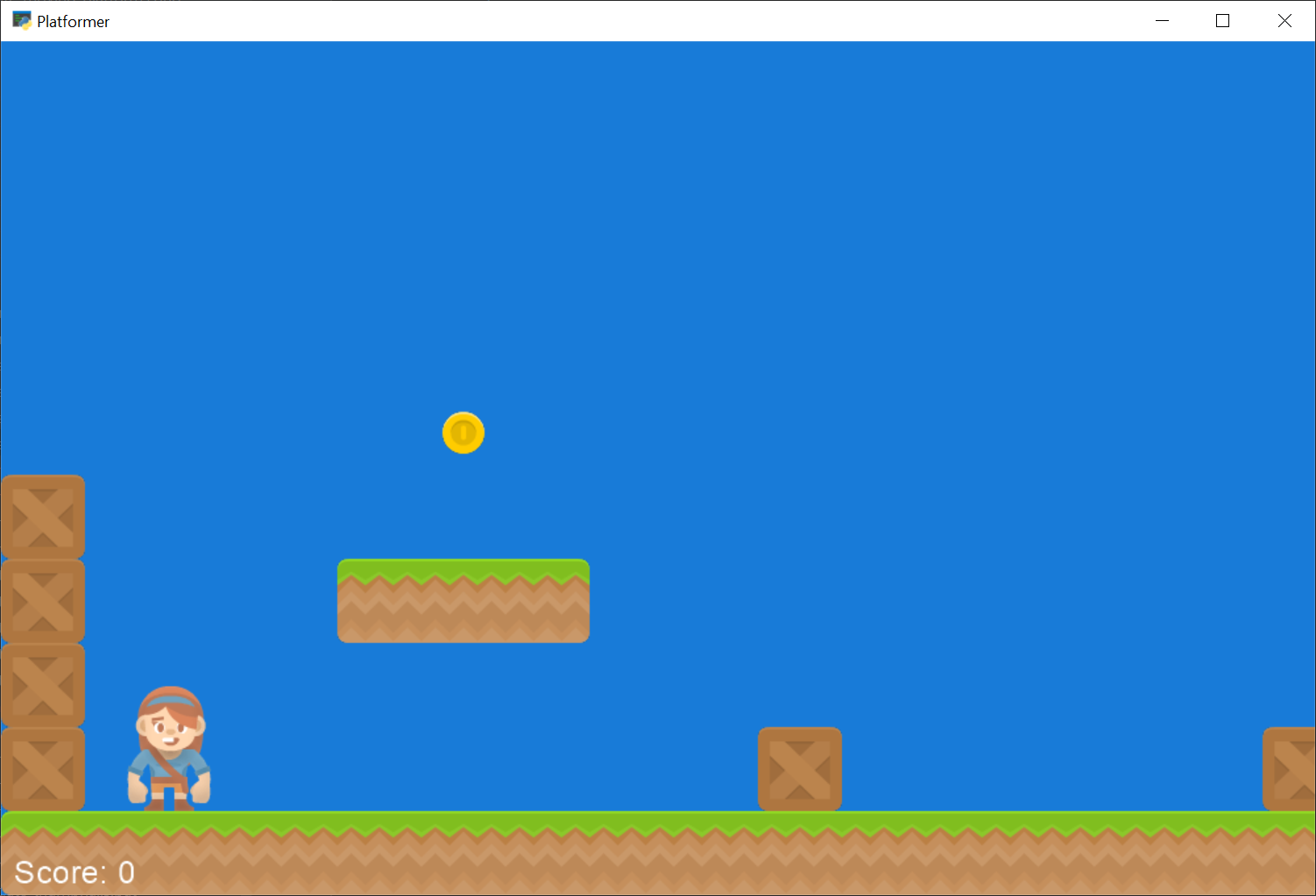平台模板#
快速开始创建您自己的平台!

关于此模板#
这是一个让你尽快开始编写侧滚平台的模板。我建议采取以下步骤:
创建一个文件夹来存放代码。将此示例复制到该文件夹,并将其命名为
main.py。确保示例代码运行良好。
将要使用的磁贴图像复制到包含代码的文件夹的子目录中。
创建一个非常简单的平铺地图使用 Tiled Map Editor 。我建议只创造一个地板,而不是其他的。有关如何创建切片地图的详细信息,请参阅 第9步-添加声音 。
将文件保存到与源代码相同的目录中。如果创建单独的平铺集,还要将其保存到与代码相同的目录中。
更新代码以加载您的文件而不是地图。
测试并确保它工作正常。
既然你确信一切正常,那就做你自己的平台吧!
警告
注意目录!
最常见的错误之一是将地图和切片集保存到与代码不同的目录中。或者在该文件夹中没有磁贴图像。如果所有内容都不在同一文件夹(或子文件夹)中,则很难在以后将其打包。
有关更详细的说明,请参阅教程 简单平台 。
源代码#
template_platformer.py#
1"""
2Platformer Template
3
4If Python and Arcade are installed, this example can be run from the command line with:
5python -m arcade.examples.template_platformer
6"""
7import arcade
8
9# --- Constants
10SCREEN_TITLE = "Platformer"
11
12SCREEN_WIDTH = 1000
13SCREEN_HEIGHT = 650
14
15# Constants used to scale our sprites from their original size
16CHARACTER_SCALING = 1
17TILE_SCALING = 0.5
18COIN_SCALING = 0.5
19SPRITE_PIXEL_SIZE = 128
20GRID_PIXEL_SIZE = SPRITE_PIXEL_SIZE * TILE_SCALING
21
22# Movement speed of player, in pixels per frame
23PLAYER_MOVEMENT_SPEED = 10
24GRAVITY = 1
25PLAYER_JUMP_SPEED = 20
26
27
28class MyGame(arcade.Window):
29 """
30 Main application class.
31 """
32
33 def __init__(self):
34
35 # Call the parent class and set up the window
36 super().__init__(SCREEN_WIDTH, SCREEN_HEIGHT,
37 SCREEN_TITLE, resizable=True)
38
39 # Our TileMap Object
40 self.tile_map = None
41
42 # Our Scene Object
43 self.scene = None
44
45 # Separate variable that holds the player sprite
46 self.player_sprite = None
47
48 # Our physics engine
49 self.physics_engine = None
50
51 # A Camera that can be used for scrolling the screen
52 self.camera_sprites = None
53
54 # A non-scrolling camera that can be used to draw GUI elements
55 self.camera_gui = None
56
57 # Keep track of the score
58 self.score = 0
59
60 # What key is pressed down?
61 self.left_key_down = False
62 self.right_key_down = False
63
64 def setup(self):
65 """Set up the game here. Call this function to restart the game."""
66
67 # Setup the Cameras
68 self.camera_sprites = arcade.camera.Camera2D()
69 self.camera_gui = arcade.camera.Camera2D()
70
71 # Name of map file to load
72 map_name = ":resources:tiled_maps/map.json"
73
74 # Layer specific options are defined based on Layer names in a dictionary
75 # Doing this will make the SpriteList for the platforms layer
76 # use spatial hashing for detection.
77 layer_options = {
78 "Platforms": {
79 "use_spatial_hash": True,
80 },
81 }
82
83 # Read in the tiled map
84 self.tile_map = arcade.load_tilemap(map_name, TILE_SCALING, layer_options)
85
86 # Initialize Scene with our TileMap, this will automatically add all layers
87 # from the map as SpriteLists in the scene in the proper order.
88 self.scene = arcade.Scene.from_tilemap(self.tile_map)
89
90 # Set the background color
91 if self.tile_map.background_color:
92 self.background_color = self.tile_map.background_color
93
94 # Keep track of the score
95 self.score = 0
96
97 # Set up the player, specifically placing it at these coordinates.
98 src = ":resources:images/animated_characters/female_adventurer/femaleAdventurer_idle.png"
99 self.player_sprite = arcade.Sprite(src, scale=CHARACTER_SCALING)
100 self.player_sprite.center_x = 128
101 self.player_sprite.center_y = 128
102 self.scene.add_sprite("Player", self.player_sprite)
103
104 # --- Other stuff
105 # Create the 'physics engine'
106 self.physics_engine = arcade.PhysicsEnginePlatformer(
107 self.player_sprite, gravity_constant=GRAVITY, walls=self.scene["Platforms"]
108 )
109
110 def on_draw(self):
111 """Render the screen."""
112
113 # Clear the screen to the background color
114 self.clear()
115
116 # Activate the game camera
117 self.camera_sprites.use()
118
119 # Draw our Scene
120 # Note, if you a want pixelated look, add pixelated=True to the parameters
121 self.scene.draw()
122
123 # Activate the GUI camera before drawing GUI elements
124 self.camera_gui.use()
125
126 # Draw our score on the screen, scrolling it with the viewport
127 score_text = f"Score: {self.score}"
128 arcade.draw_text(score_text,
129 x=10,
130 y=10,
131 color=arcade.csscolor.WHITE,
132 font_size=18)
133
134 def update_player_speed(self):
135
136 # Calculate speed based on the keys pressed
137 self.player_sprite.change_x = 0
138
139 if self.left_key_down and not self.right_key_down:
140 self.player_sprite.change_x = -PLAYER_MOVEMENT_SPEED
141 elif self.right_key_down and not self.left_key_down:
142 self.player_sprite.change_x = PLAYER_MOVEMENT_SPEED
143
144 def on_key_press(self, key, modifiers):
145 """Called whenever a key is pressed."""
146
147 # Jump
148 if key == arcade.key.UP or key == arcade.key.W:
149 if self.physics_engine.can_jump():
150 self.player_sprite.change_y = PLAYER_JUMP_SPEED
151
152 # Left
153 elif key == arcade.key.LEFT or key == arcade.key.A:
154 self.left_key_down = True
155 self.update_player_speed()
156
157 # Right
158 elif key == arcade.key.RIGHT or key == arcade.key.D:
159 self.right_key_down = True
160 self.update_player_speed()
161
162 def on_key_release(self, key, modifiers):
163 """Called when the user releases a key."""
164 if key == arcade.key.LEFT or key == arcade.key.A:
165 self.left_key_down = False
166 self.update_player_speed()
167 elif key == arcade.key.RIGHT or key == arcade.key.D:
168 self.right_key_down = False
169 self.update_player_speed()
170
171 def center_camera_to_player(self):
172 # Find where player is, then calculate lower left corner from that
173 screen_center_x = self.player_sprite.center_x
174 screen_center_y = self.player_sprite.center_y
175
176 # Set some limits on how far we scroll
177 if screen_center_x - self.width/2 < 0:
178 screen_center_x = self.width/2
179 if screen_center_y - self.height/2 < 0:
180 screen_center_y = self.height/2
181
182 # Here's our center, move to it
183 player_centered = screen_center_x, screen_center_y
184 self.camera_sprites.position = arcade.math.lerp_2d(self.camera_sprites.position, player_centered, 0.1)
185
186 def on_update(self, delta_time):
187 """Movement and game logic"""
188
189 # Move the player with the physics engine
190 self.physics_engine.update()
191
192 # See if we hit any coins
193 coin_hit_list = arcade.check_for_collision_with_list(
194 self.player_sprite, self.scene["Coins"]
195 )
196
197 # Loop through each coin we hit (if any) and remove it
198 for coin in coin_hit_list:
199 # Remove the coin
200 coin.remove_from_sprite_lists()
201 # Add one to the score
202 self.score += 1
203
204 # Position the camera
205 self.center_camera_to_player()
206
207 def on_resize(self, width: int, height: int):
208 """ Resize window """
209 super().on_resize(width, height)
210 self.camera_sprites.match_screen(and_projection=True)
211 self.camera_gui.match_screen(and_projection=True)
212
213
214def main():
215 """Main function"""
216 window = MyGame()
217 window.setup()
218 arcade.run()
219
220
221if __name__ == "__main__":
222 main()